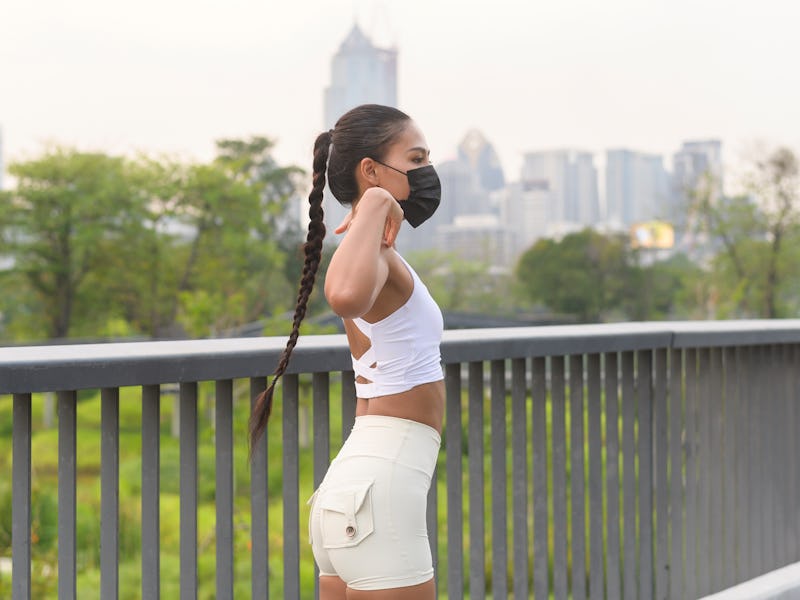This indispensable habit reduces your risk of getting Covid-19
Surprise — an exercise habit protects us against the novel pathogen.

For all the data (and there is plenty) demonstrating that regular exercise is one of the best ways to boost mood, well-being, the immune system, and more, it still can be pretty tough to make into a regular habit.
Thanks to a study recently published in the British Journal of Sports Medicine by researchers in Spain, we have yet another timely reminder to exercise more.
Podiatrist, physical therapist, and lead author Yasmin Ezzatvar has produced what she believes is the first meta-analysis of studies examining how regular exercise affects risks associated with Covid-19.
Most prominently, Ezzatvar gleaned from these studies that regular exercise was associated with an 11 percent lower risk of contracting Covid-19. But it doesn’t stop there.
“The stronger your body is, the better for everything — not only for Covid, but you will reduce the risk of a lot of other diseases that probably make you even more vulnerable for Covid,” she says.
LONGEVITY HACKS is a regular series from Inverse on the science-backed strategies to live better, healthier, and longer without medicine. Get more in our Hacks index.
Science in action — In this meta-analysis, Ezzatvar and her team rounded up and reviewed 16 studies on regular exercise and Covid-19 risk, including a total of 1,853,610 participants. She standardized the data for these disparate studies and assessed outcomes based on risk of infection with Covid-19, the severity of symptoms, and mortality.
As this analysis compiles data across more than a dozen studies, Ezzatvar assessed a suite of methods and outcomes. The various studies gathered information through accelerometers, smart devices, questionnaires, and other means, so they all gathered slightly differing data. That said, while Ezzatvar is confident in her findings, she wants to see replicate meta-analyses for confirmation.
“In my opinion, it should [have been] done earlier,” Ezzatvar tells Inverse. Of course, in order to have a meta-analysis, one needs first a host of analyses. Though she scoured databases for studies dated between November 2019 and March 2022, ultimately she looked at mostly pre-vaccinated groups of people.
Why it’s a hack — This meta-analysis quantifies regular exercise with the metabolic equivalent of task (MET) per week. A MET-min represents the amount of energy expended per minute, and Ezzatvar finds that 500 MET-min weekly achieved the best results in these past studies. That’s equivalent to 150 minutes of moderate-intensity or 75 minutes of vigorous-intensity exercise each week.
While regular exercise offers an added health boost, it’s not a replacement for the vaccine. In fact, Ezzatvar says, her study has nothing at all to do with vaccination.
“These are separate things,” she tells Inverse. “Being physically active is absolutely independent of vaccines... vaccines are important, and I would recommend [getting] vaccinated.”
The natural next question is to assess regular exercise and Covid-19 risk in those who have been vaccinated, perhaps comparing people who have been vaccinated to those who have not.
How it affects longevity — Regular exercise juices nearly every part of the mind and body. The World Health Organization’s (WHO) 2020 guidelines for exercise recommend 150 to 300 minutes of brisk exercise weekly, like walking, or 75 to 150 minutes of intense exercise weekly, like running or playing a team sport. Those numbers are in line with the MET-min correlated with protection from Covid.
The WHO also suggests two or three days a week of strength training, which Ezzatvar wholeheartedly supports. “It’s absolutely mandatory,” she says. Muscle strengthening exercises are about more than looking buff. Pumping iron helps prevent the risk of fracture and injury as we get older when even a fall can send someone to the hospital. Healthy muscles improve and extend the body’s functional capacity as we age.
Covid rocked the world as a highly contagious respiratory infection that put the young and old alike on ventilators. One study found that 75 percent of hospitalized Covid patients required supplemental oxygen. As exercise boosts holistic health, including immunity, it can protect against Covid as well as other diseases.
Hack score — 🏊🏿♂️🚶🏿♀🚶🏻🏃🏼🏃🏼🚴🏼🏊🏼 (7/10 regular, Covid-vaccinated exercisers)
This article was originally published on